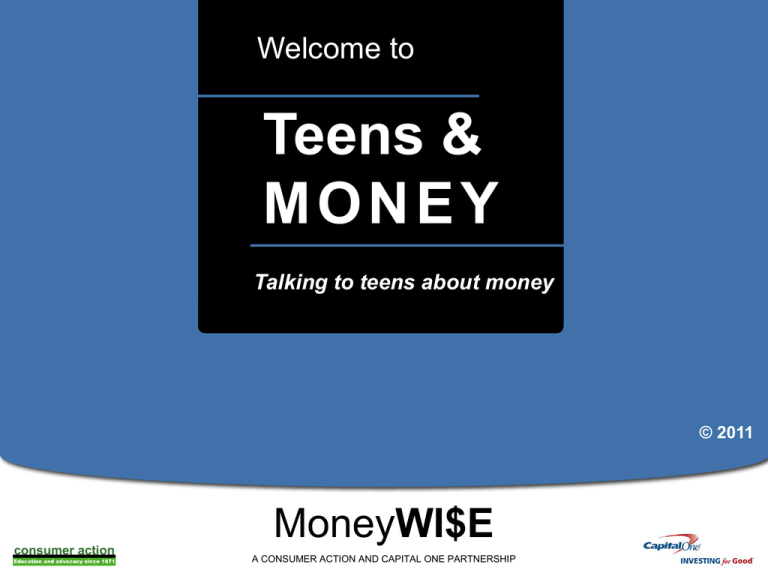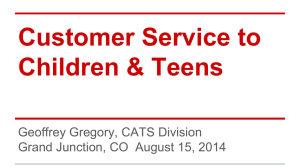Talking to Teens about Money - Powerpoint
advertisement

Welcome to Teens & MONEY a Talking to teens about money © 2011 MoneyWI$E A CONSUMER ACTION AND CAPITAL ONE PARTNERSHIP MoneyWI$E A joint financial education project of Consumer Action and Capital One Services, Inc. MoneyWI$E A CONSUMER ACTION AND CAPITAL ONE PARTNERSHIP There will be two sessions of two hours each. Each two-hour session will include a 15-minute break. MoneyWI$E A CONSUMER ACTION AND CAPITAL ONE PARTNERSHIP To give parents the tools to talk to their teens about money. MoneyWI$E A CONSUMER ACTION AND CAPITAL ONE PARTNERSHIP Parents play a key role in shaping kids’ values and attitudes about money management. Children who received information about money management at home are more financially literate than those who are only taught money skills only in school. MoneyWI$E A CONSUMER ACTION AND CAPITAL ONE PARTNERSHIP Teens are under tremendous pressure to conform with their peers. Only a strong role model can counteract teen peer pressure. Kids today have considerable disposable income—and they are a target for advertisers and marketers. MoneyWI$E A CONSUMER ACTION AND CAPITAL ONE PARTNERSHIP Why do you think it is important to provide teens with a strong adult role model? MoneyWI$E A CONSUMER ACTION AND CAPITAL ONE PARTNERSHIP Shopping has become a recreational pastime for many families. What are some family activities that you don’t have to spend much money on? MoneyWI$E A CONSUMER ACTION AND CAPITAL ONE PARTNERSHIP Needs and Wants Do you think teenagers know the difference between needs and wants? MoneyWI$E A CONSUMER ACTION AND CAPITAL ONE PARTNERSHIP Everyone has to set priorities on what they want. Basic needs (food, clothing, shelter, education and transportation) take priority. Overspending is an addiction that can lead to debt and even bankruptcy. MoneyWI$E A CONSUMER ACTION AND CAPITAL ONE PARTNERSHIP Write your opinion whether the items listed are needs or wants. Give a short reason why you feel that way. Assign a price to the item. Suggest an alternative to the item listed. MoneyWI$E A CONSUMER ACTION AND CAPITAL ONE PARTNERSHIP Having a job helps kids prepare for adult life. Work habits formed as a teenager follow you for the rest of your life. Teaching financial responsibility can be difficult if kids don’t know what it’s like to earn their own money. MoneyWI$E A CONSUMER ACTION AND CAPITAL ONE PARTNERSHIP Teens 16 and older generally can work full time, although some states may limit the times of day they can work. Teens aged 14 and 15 can work 18 hours a week but no more than three hours on school days. In the summer, they can work 40 hours a week, eight hours a day. Younger teens can do odd jobs such as running errands, babysitting, dog walking or lawn mowing. MoneyWI$E A CONSUMER ACTION AND CAPITAL ONE PARTNERSHIP Employment Skills What skills did you gain from your first job? MoneyWI$E A CONSUMER ACTION AND CAPITAL ONE PARTNERSHIP Looking For a Job What are some ways you can help teens begin a job search? MoneyWI$E A CONSUMER ACTION AND CAPITAL ONE PARTNERSHIP Getting the Job What are some things to tell teens about getting and holding onto a job? MoneyWI$E A CONSUMER ACTION AND CAPITAL ONE PARTNERSHIP Young people who receive their first paycheck are often surprised that their take-home pay is less than they expected. Make sure your kids understand that they can avoid withholding too much by claiming additional allowances on the W-4 form they get from their employer. MoneyWI$E A CONSUMER ACTION AND CAPITAL ONE PARTNERSHIP Classroom Activity Take 5 minutes to answer the questions. MoneyWI$E A CONSUMER ACTION AND CAPITAL ONE PARTNERSHIP What is the pay period at Dynamite Data Computer Superstore? Why are Jamal’s current total deductions the same amount as his year-to-date deductions? What amount has been withheld from Jamal’s paycheck for his federal income tax withholding? (con’t) MoneyWI$E A CONSUMER ACTION AND CAPITAL ONE PARTNERSHIP Does “gross” pay mean before taxes or after taxes? What is the total amount taken from Jamal’s paycheck for the Federal Insurance Contribution Act (FICA) which includes Social Security and Medicare deductions? Why do you think that no deductions are taken from Jamal’s paycheck for medical insurance and retirement? MoneyWI$E A CONSUMER ACTION AND CAPITAL ONE PARTNERSHIP Let’s Take a Break Please be back in 15 minutes. MoneyWI$E A CONSUMER ACTION AND CAPITAL ONE PARTNERSHIP Budgeting A budget is a spending plan to help forecast and control expenses. • Teens can be impulsive and a budget can help them step back and look at where their money goes. MoneyWI$E A CONSUMER ACTION AND CAPITAL ONE PARTNERSHIP Tracking What You Spend What are some ways to track spending? MoneyWI$E A CONSUMER ACTION AND CAPITAL ONE PARTNERSHIP Value of Budgeting What can teens gain from keeping a budget? MoneyWI$E A CONSUMER ACTION AND CAPITAL ONE PARTNERSHIP The take-home worksheet in your folders can be used to track weekly expenses. Use the information to design a budget. MoneyWI$E A CONSUMER ACTION AND CAPITAL ONE PARTNERSHIP Comparison shopping means that you “shop around” in person, by phone or on the Internet, to compare prices in order to find the best deal, before you buy. MoneyWI$E A CONSUMER ACTION AND CAPITAL ONE PARTNERSHIP What is a good reason to consider buying second-hand or used items? MoneyWI$E A CONSUMER ACTION AND CAPITAL ONE PARTNERSHIP One of the most important lessons for teens is learning how to handle a bank account properly. As an alternative to a bank account, your children may be able to open an account at a local credit union. MoneyWI$E A CONSUMER ACTION AND CAPITAL ONE PARTNERSHIP A credit union is a non-profit cooperative financial institution owned and controlled by its members. • To find a credit union that you can join, call the Credit Union National Association at 800-358-5710, or visit its web site (www.cuna.org). MoneyWI$E A CONSUMER ACTION AND CAPITAL ONE PARTNERSHIP Your money is safe from loss, theft or fire. Each account is insured up to $250,000 by the FDIC (banks) or the National Credit Union Share Insurance Fund (credit unions). Canceled checks are proof that you paid a bill. Using check-cashing stores and money orders is more expensive than paying bank fees. A bank account can help you keep track of how you spend your money. MoneyWI$E A CONSUMER ACTION AND CAPITAL ONE PARTNERSHIP Checking and savings accounts are great ways to help young people learn to manage money. MoneyWI$E A CONSUMER ACTION AND CAPITAL ONE PARTNERSHIP What should you look for when comparing accounts? What are some ways to help your teen find a bank account? • TIP: Bankrate.com (www.bankrate.com) allows you to find and compare checking and savings accounts by ZIP code or city. MoneyWI$E A CONSUMER ACTION AND CAPITAL ONE PARTNERSHIP What are some things to avoid when looking for a checking account for your teen? What should you bring with you when you go with your teen to open a bank account? MoneyWI$E A CONSUMER ACTION AND CAPITAL ONE PARTNERSHIP Make sure you have enough money in the bank to cover the check. Review your bank statement promptly. Record all the checks you write in your checkbook register or use duplicate checks that create a carbon copy of each check. Deposit paychecks and other checks in a timely manner—most checks cannot be cashed after three months. Use a pen (never a pencil) to write checks. Write your checks legibly. MoneyWI$E A CONSUMER ACTION AND CAPITAL ONE PARTNERSHIP (con’t) Fill in the check amount and payee well to the left to prevent someone from adding numbers to make the check larger or altering the payee’s name. If you need to correct a mistake on a check, tear up the check, enter it as “void” in your checkbook register and write a new check. Don’t sign blank checks—they can be stolen or used by someone else. Know where your checkbook is at all times and report a missing checkbook to your bank immediately. MoneyWI$E A CONSUMER ACTION AND CAPITAL ONE PARTNERSHIP This simple activity reinforces good habits when writing a check. MoneyWI$E A CONSUMER ACTION AND CAPITAL ONE PARTNERSHIP Next time we will cover: • Balancing a checkbook • Saving • Credit reports • Credit cards • Teen drivers • Cell phones MoneyWI$E A CONSUMER ACTION AND CAPITAL ONE PARTNERSHIP Thank you for your attention and participation. MoneyWI$E A CONSUMER ACTION AND CAPITAL ONE PARTNERSHIP Session Two MoneyWI$E A CONSUMER ACTION AND CAPITAL ONE PARTNERSHIP During the first session we covered teen attitudes, outside pressures, needs versus wants, working, paychecks, budgeting, comparison shopping, banking for youths and writing checks. • Do you have any questions about the topics we covered in last week’s session? MoneyWI$E A CONSUMER ACTION AND CAPITAL ONE PARTNERSHIP One of the most important financial lessons is how to balance a checkbook. If you fail to keep an accurate record, you could bounce a check. MoneyWI$E A CONSUMER ACTION AND CAPITAL ONE PARTNERSHIP Take 5 minutes to work on the exercise. MoneyWI$E A CONSUMER ACTION AND CAPITAL ONE PARTNERSHIP Today’s savings interest rates are so low, it’s tough to get kids interested in the power of savings. • Do you have any suggestions on how to get kids to save money? MoneyWI$E A CONSUMER ACTION AND CAPITAL ONE PARTNERSHIP Why is it important to make frequent, regular deposits to a savings account? MoneyWI$E A CONSUMER ACTION AND CAPITAL ONE PARTNERSHIP Classroom Exercise MoneyWI$E A CONSUMER ACTION AND CAPITAL ONE PARTNERSHIP What are some differences between the young women’s spending habits? Does anything either of the girls bought seem like an extravagance? Can you think of some ways that Monica could start saving more of her earnings? MoneyWI$E A CONSUMER ACTION AND CAPITAL ONE PARTNERSHIP It is very important in today’s society to have a good credit history. Bad credit shows up on your “credit report”—information about your past use of credit compiled by companies called credit reporting bureaus. MoneyWI$E A CONSUMER ACTION AND CAPITAL ONE PARTNERSHIP Credit reports are increasingly used by employers to screen applicants. In certain fields—like financial services, technology and law enforcement—credit checks for job applicants are required. MoneyWI$E A CONSUMER ACTION AND CAPITAL ONE PARTNERSHIP Everyone who has had a credit card or a loan will have a credit report. Since most young people do not acquire their first credit card until they are 18, only a small number of younger teens have credit reports. If you allow your teen to be an “authorized user” of your credit card, he or she will have a credit report. MoneyWI$E A CONSUMER ACTION AND CAPITAL ONE PARTNERSHIP Please be back in 15 minutes. MoneyWI$E A CONSUMER ACTION AND CAPITAL ONE PARTNERSHIP Many parents allow their children to get a credit card so that they will have access to emergency funds. • If monitored carefully, credit cards can be helpful in teaching your children how to manage money. • Close to two-thirds of college students have at least one credit card. MoneyWI$E A CONSUMER ACTION AND CAPITAL ONE PARTNERSHIP Is it a good idea for college-age children to have a credit card? Can you think of any ways to control a student’s use of credit cards? MoneyWI$E A CONSUMER ACTION AND CAPITAL ONE PARTNERSHIP Why do you think credit card companies are so willing to give credit cards to four-year college students? What makes a good credit card deal? What happens when you make a late payment on your credit card? MoneyWI$E A CONSUMER ACTION AND CAPITAL ONE PARTNERSHIP The cost of auto insurance for young drivers—especially boys— can be shockingly high. MoneyWI$E A CONSUMER ACTION AND CAPITAL ONE PARTNERSHIP Teen driver statistics give insurance underwriters a reason to charge the highest premiums for young drivers. MoneyWI$E A CONSUMER ACTION AND CAPITAL ONE PARTNERSHIP Can you think of things that would help cut down on the cost of auto insurance for teenaged drivers? MoneyWI$E A CONSUMER ACTION AND CAPITAL ONE PARTNERSHIP Many teens don’t understand that there are significant costs involved with owning, maintaining and operating a car. • Turn to page 19 in the “Talking to Teens About Money” booklet • Review the chart titled “Monthly Cost of Owning a Car. MoneyWI$E A CONSUMER ACTION AND CAPITAL ONE PARTNERSHIP Cell Phones We all know how much teenagers love the phone! What Teens make up an important segment of the cell phone market. Many parents pay for cell phone service to keep track of their children and to make sure they can get help in an emergency. MoneyWI$E A CONSUMER ACTION AND CAPITAL ONE PARTNERSHIP How many of your kids have their own cell phones? • What have you found are good ways to limit the cost of cell phone service? MoneyWI$E A CONSUMER ACTION AND CAPITAL ONE PARTNERSHIP ‘Family’ wireless plans charge for minutes when you make and receive calls, which can result in double charges when you are talking to another family member On a cell phone, even toll-free numbers cost money The charges for directory assistance and connecting calls can be surprisingly high (con’t) MoneyWI$E A CONSUMER ACTION AND CAPITAL ONE PARTNERSHIP Prepaid cell phone plans charge rates of up to 45¢ per minute. Custom ring tones, voice mail and other optional services usually result in additional charges. Text messaging often carries a permessage charge and some plans levy an extra per-minute charge to download email or browse the web. MoneyWI$E A CONSUMER ACTION AND CAPITAL ONE PARTNERSHIP Do you have any questions on our presentation? MoneyWI$E A CONSUMER ACTION AND CAPITAL ONE PARTNERSHIP Consumer Action created the MoneyWI$E trainings. • www.consumer-action.org • 415-777-9635 • info@consumer-action.org MoneyWI$E A CONSUMER ACTION AND CAPITAL ONE PARTNERSHIP Congratulations! You’ve completed the MoneyWI$E training on Talking to Teens About Money. Please fill out the MoneyWI$E evaluation form and leave it on your way out. MoneyWI$E A CONSUMER ACTION AND CAPITAL ONE PARTNERSHIP Visit money-wise.org for additional information and to access free financial education materials MoneyWI$E A CONSUMER ACTION AND CAPITAL ONE PARTNERSHIP











